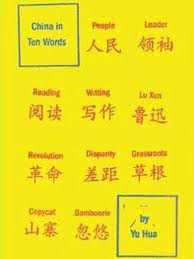I recall reading something on censorship and artistic expression by J.M. Coetzee. He was using a poem where an African National Congress member couldn't directly report on the death from torture, suffered by a fellow ANC activist, during South Africa's regime of Apartheid.
Ingeniously, he composed a poem on how the prisoner, repeatedly slipped and fell on a bar of soap, till he fell and broke into smithereens, inside his prison cell.
Words, Coetzee says, can help bypass censorship and yet evoke the truth that the writer wishes to convey.
Popular Chinese novelist, Yu Hua, uses a similar linguistic tactic in China in Ten Words, his nonfiction accounting of modern day China.
The ten words are as follows: people, leader, reading, writing, revolution,disparity, grassroots, copycat, bamboozle and Lu Xun (an influential early 20th-century writer). None of these words are banned in China, but they are used subversively by the writer.
Here is an instance of that indirect journey of subversion that a word like "people" makes in Hua's book: It's a positive word used by the Chinese state very frequently to suggest complete democracy and "people's power." Hua, co opts the word from the bureaucratic lexicon and creates an occasion to discuss the Tienanmen Square incident of June 4, 1989, when the Chinese army opened fire on unarmed pro-democracy demonstrators.

No comments :
Post a Comment